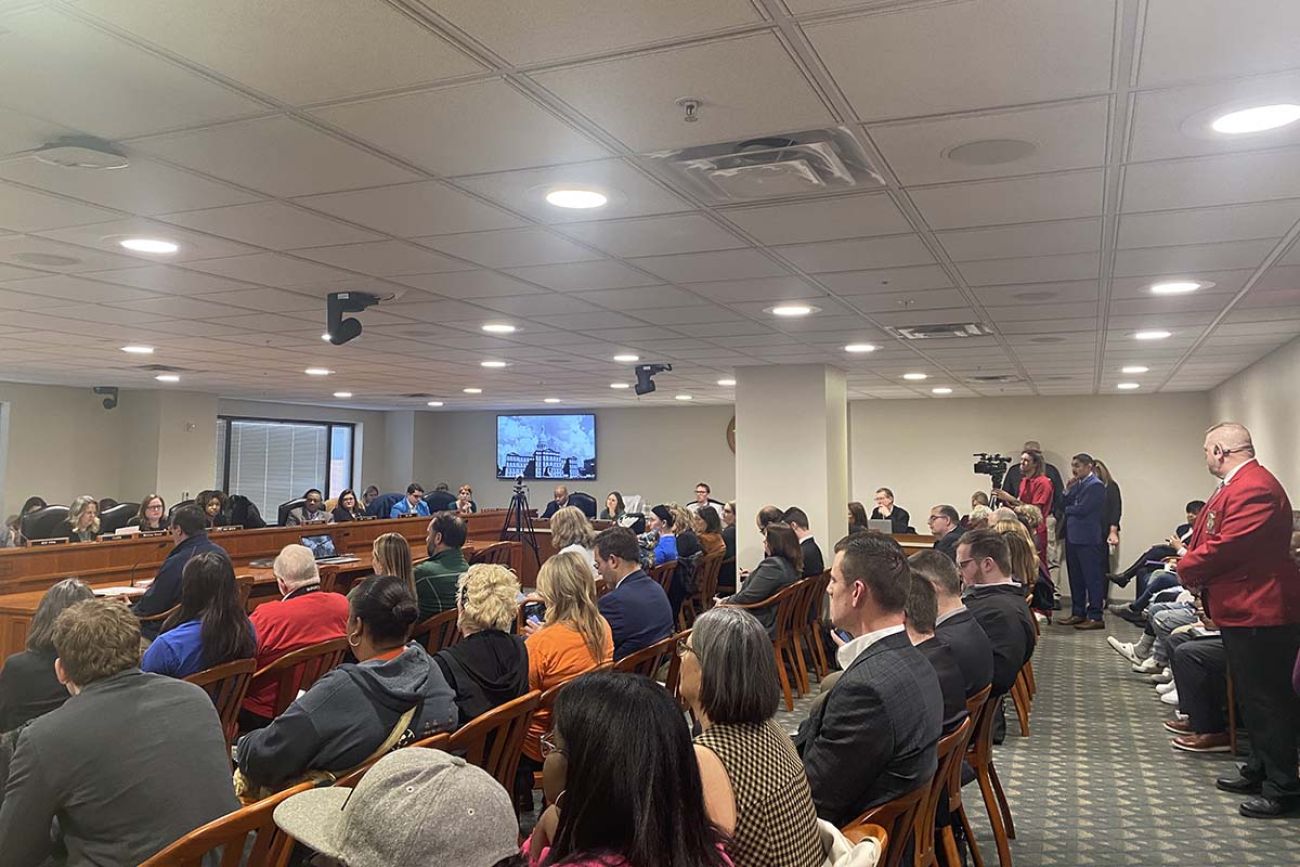‘We’re so angry.’ MSU students urge gun safety at Lansing hearing

- Lawmakers held first hearing on gun reform legislation weeks after Michigan State University shooting
- MSU students called for more action on gun reform, mental health supports and for officials to listen to their needs
- Democrats promise speedy action, but said they need time to take testimony, consider changes
LANSING — Michigan lawmakers kickstarted the process of moving a package of gun reform bills through the Legislature Wednesday, queuing up proposals for safe storage, background checks and “red flag” laws for speedy floor votes.
After hearing from activists, former politicians and people who have lived through gun violence — including Michigan State University students still reeling from a Feb. 13 mass shooting that killed three students and seriously injured five others — lawmakers promised their pleas for solutions would not be in vain.
Related:
- Michigan Democrats move to tighten gun rules after MSU shootings
- Michigan State shooting updates
- Gun control a priority for Michigan Democrats. What studies say about reforms.
“We will give you a reason to stop protesting at the Capitol, because we know that we, as a government body, are the ones that gave you a reason to be there in the first place,” Rep. Emily Dievendorf, D-Lansing, told MSU students in attendance.
The bills are “not the final product — they are a starting point” and will undergo tweaks in coming weeks, House Judiciary Committee Chair Kelly Breen, D-Novi, said Wednesday.
The committee took testimony on a 11-bill House package, and senators are set to hold hearings on their version of the bills yet this week.
Taken together, the proposed bills before the legislature take a three-pronged approach to reducing gun violence: implement universal background checks, put safe storage laws in place to reduce accidents or youth access to firearms and implement “red flag” laws to allow a person’s gun to be taken away temporarily if they are deemed a danger to themselves or others.
Already a priority for Michigan Democrats who now hold majorities in the state legislature, the issue took on additional significance in the aftermath of the Michigan State University shooting.
Michigan State University senior Carl Austin Miller Grondin, told lawmakers Wednesday that he was “so tired” and “so angry.”
Grondin’s younger sister was on campus the night of the shooting. As Grondin drove back to campus, he called several friends to ensure they were OK.
“We want change,” Grondin, vice president of internal administration at the Associated Students of MSU, said Wednesday. “We demand change. We want to ensure that we are not another statistic.”
Legislative leaders reiterated promises to pass legislation quickly, noting that they’d been working on the initial bills prior to the shooting and recognize the need for expediency, but want to provide time for testimony and deliberation.
“We want to make sure that we’re doing this right, and that these laws are well written and that they stand up to the scrutiny of any challenges in the future,” Senate Majority Leader Winnie Brinks, D-Grand Rapids, said during a Wednesday morning press call with Everytown for Gun Safety and Students Demand Action.
Brinks’ daughter, a Michigan State University student, was on campus during the recent shooting.
Sawyer McClure, president of MSU’s Interfraternity Council, focused his testimony on the heartbreak and confusion students are feeling and the need for mental health support, particularly for those who may not feel comfortable asking for help.
McClure, who delivered a statement on behalf of one of shooting victims Brian Fraser’s close friends and fraternity brother, called on student leaders and lawmakers to continue to make sure students are being heard and encouraged to share the feelings they’re dealing with.
“Far too often, mental health conversations in fraternities are limited to a simple phrase: ‘You good, bro?’,” McClure said. “The conversation cannot end there. There’s far more that needs to be discussed than a two second check in.”
“These men will live with these memories and experiences for the rest of their lives,” he continued. “We as student leaders and elected officials must ensure that these students are not bearing them alone.”
Late last year, Bridge Michigan reviewed more than 20 studies on safe storage, red flag laws and universal background check laws. Most studies indicate such laws help reduce gun-related injuries and deaths, but some scholars contend more time and data are needed to make conclusions.
Natasha Bagdasarian, chief medical executive for the state of Michigan, and other doctors called to testify made the case to lawmakers that firearm deaths and gun violence should be considered a serious, preventable public health issue that is disproportionately impacting young people.
“Firearm deaths are a public health issue in every region of our state,” Bagdasarian told lawmakers. “They impact every segment of our society.”
Various gun reform proposals have been introduced in previous legislative sessions, but saw little traction in a Republican-majority legislature. A 2021 shooting at Oxford High School was met with inaction at the state legislative level.
Opponents of the proposed reforms argue the Democrats’ proposal has the potential to strip gun owners of their rights without due process. No opponents were brought forward to testify Wednesday, although testimony is expected to continue next week.
One advocacy group, Great Lakes Gun Rights, threatened starting recall petitions for any politicians who vote for the proposals.
Some Republicans are urging bipartisan support, however. Former Congressman Fred Upton of St. Joseph, who retired from his post last year, told the committee former President Donald Trump and Republican officials in several other states have supported similar gun measures.
“If not now, when after Michigan State? If not you, who is going to do it?” he said. “Heaven help us if we have another one without any action.”
Brinks, Tate and Lt. Gov. Garlin Gilchrist said Wednesday they’re prepared to bring up additional gun-related legislation as needed, whether it’s tightening safety measures for the Capitol and other state-owned buildings, addressing mental health needs or other policy concepts.
The current measures before lawmakers should be the “the floor, and not the ceiling” for addressing gun violence, Gilchrist said.
Brinks noted there is “not just one bill or one set of bills that will solve all of our problems,” adding, “this is a comprehensive approach that we intend to take” to ensure future generations of kids won’t have to grow up worrying about the ever-present threat of gun violence.
Michigan Democrats intend to pass gun reforms with or without Republican support, she said.
The House and Senate packages are not the only gun-related bills up in the Legislature.
Earlier this week, lawmakers in the House Elections Committee took testimony on a proposal to ban guns within 100 feet of polling places. Clerks from East Lansing and Detroit tearfully told state lawmakers that a ban is needed to protect election workers and the public.
Marie Wicks, the interim city clerk for East Lansing, told lawmakers the current atmosphere of threats and harassment have made it difficult to attract and retain clerks and election workers due to fear of being harmed, and said she was concerned weapons in polling locations would be triggering for MSU students and other survivors of gun violence.
The Michigan State Capitol Commission also took steps this week to fully ban firearms from the MIchigan Capitol building, a proposed change Attorney General Dana Nessel and other prominent Democrats have supported.
Votebeat reporter Oralandar Brand-Williams contributed to this report.
See what new members are saying about why they donated to Bridge Michigan:
- “In order for this information to be accurate and unbiased it must be underwritten by its readers, not by special interests.” - Larry S.
- “Not many other media sources report on the topics Bridge does.” - Susan B.
- “Your journalism is outstanding and rare these days.” - Mark S.
If you want to ensure the future of nonpartisan, nonprofit Michigan journalism, please become a member today. You, too, will be asked why you donated and maybe we'll feature your quote next time!




